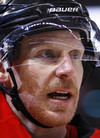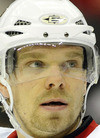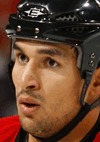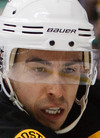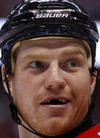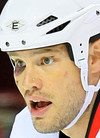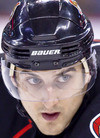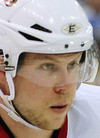Ottawa Senators mid-term report card: Forwards
We're a little ways past the mid-way point of the season, but we've got a good opportunity to look back on the first half of the season and grade the performance of the Ottawa Senators so far. As a team, Ottawa's probably surpassed quite a few expectations, and they've done it with plenty of significant injuries to significant players: Most recently, Daniel Alfredsson and Jason Spezza, but don't forget about the fairly long-term absences of Pascal Leclaire, Filip Kuba, Anton Volchenkov, Chris Neil, and a few others.
Group success aside, however, it's important to look at the individuals who are responsible for the lion's share of the Senators' current standing, and also to find out who's got to pull up their socks. We'll look at the forwards today, beginning with the highest salary cap hit and moving down to the lowest. Which brings us to...
Even cutting him slack for missing time due to injury, Spezza hasn't made the grade so far this season. He's rounded out the defensive side of his game, which is a great improvement, but what the Senators' top centre needs to do when he returns is incorporate the defensive responsibility into his offensive style in order to get back to top grades. If he doesn't, he may not be the top centre for too much longer.
(Read the rest of the forwards... )
Despite really stepping up his game since the injuries to Spezza and Alfredsson, Kovalev still has a long way to go if his signing is going to be seen as a success for Sens GM Bryan Murray. His 11 goals look good, but three- and four-goal performances skew that total, and make a player who's been a passenger on many nights look like a more consistent producer. Most worrisome, though, is his one powerplay goal and only five powerplay assists. The Senators currently sit second-last in the league for powerplay efficiency, and if that's going to change, Kovalev should be expected to be a huge part of the improvement.
Hard to complain about the performance of the captain so far this season. He'd been leading the team in scoring from the start of the season until he went down to injury, and is routinely looked to in all situations--powerplay, penalty killing, and even-strength--to lead the team. More goal scoring would get the captain a higher grade, but there's no doubt that he's been delivering on his new contract.
He started the season off with a bang, but has really tailed off into the second quarter of the season. Not just has his point totals fallen off, but he seems to be playing with less speed and intensity, and there's little doubt that's what has caused a slowdown in his production. He's got all the assets to pick up his production and improve his grades by the end of the year, but he's got to make good use of them.
Mike Fisher has never played this well. Whether it was his time at the World Championships last summer, his blossoming relationship with Carrie Underwood, his now-uncontested place as a member of this team's leadership core, or just some personal awakening, he's playing like the offensively capable power forward he's paid to be. Hopefully it wasn't all a ruse to impress Steve Yzerman and work for a spot on the Canadian Olympic squad, and his success will continue through the season and playoffs.
Cheechoo seems to have found his comfort zone now with the Senators, but there were plenty of games at the start of the season where he looked like he didn't belong anywhere near an NHL roster. He's started putting up a few points and trying to contribute in a checking role, but anyone who didn't know before now realizes that his sniping days are far behind him. Still, from day one to the mid-way point, Cheechoo is one of the most improved players.
Kelly is a role player. He may be a well-paid role player, but he's a reasonably solid third-line centre who kills penalties very effectively. As frustrating as it may be to see Kelly pass the puck while on a breakaway, he's put up decent point totals so far, and there's no denying his success on the PK. For a defensive centre, though, -1 isn't a very good plus/minus rating.
After looking at Neil's performance last season and the one before and comparing it to the way he's played this year, you'd expect him to have a significant grade-improvement, and he has. It may be his appreciation for some pugilistic support in the form of Matt Carkner, but Neil seems to have been able to open up his game and has cut down on the number of stupid, undisciplined, and often costly minor penalties without compromising his physical presence: He's taken 17 minor penalties, not great but not awful, but is 12th in the league with 126 hits, despite playing only 29 games (far fewer than anyone ahead of him on the list). Better offensive numbers would get him a better grade, and some increased powerplay time might help him get there.
In terms of efficiency of time on ice, Ruutu is probably among the team's leaders. With an average of 12:42 TOI/GP, Ruutu's eighth in team scoring, and he's scoring with relative consistency. He's looked to for a lot more than offence, though, and Ruutu continues to be chief among the Senators' troublemakers, all the while maintaining his composure for significant penalty-killing time.
After a slow start that was further slowed by an injury, Foligno seems to be finding his groove again. He's in a dogfight to retain a spot in the Senators' top-six forward ranks if (maybe when) the team is healthy again, so he's really going to have to step up his offensive game to prove that he belongs with the team's top forwards on a regular basis, instead of languishing in a third-line role.
Chum can always be counted on to bring energy to every shift he plays, and on many nights it's unfortunate that he plays so few. Without more production, though, it's hard to give him a higher grade than a B+, in recognition of him doing most of what a fourth-liner should do, but missing out on the points that would put him at the top of the class.
After an incredible pre-season, Regin seemed caught up in the bright lights once the regular season started, and I was beginning to consider him a candidate for re-assignment to Binghamton. As the season wore on, though, his play picked up its speed, and he's looking more like the physically capable, offensively creative centreman he's expected to be. His points haven't caught up yet, but they should with time.
If Cheechoo wasn't the most improved player from the start of the season to the mid-point, then that honour would definitely go to Ryan Shannon. To start the season, he was lost on the roster, playing himself out of the top six and down to fourth-line play with little in his favour. Now, Shannon's found his legs, is strong on the forecheck again, and his grade is quickly rising. Still, taking into consideration how invisible he was to start the season, Shannon's grade isn't as good as his most recent play would have you believe.
An early-season injury set him back, but Winchester re-joined the team with little lost from last season: He's still got his speed, and finishes his checks when he gets the odd even-strength shift. The experiment with Winch at centre on the team's top line didn't pan out, but he's as advertised, and consistent. His point totals aren't great, but he doesn't get much ice time, and about 12 per cent of his TOI/GP (10:58 TOI) is while short-handed (1:22 SHTOI/GP).



